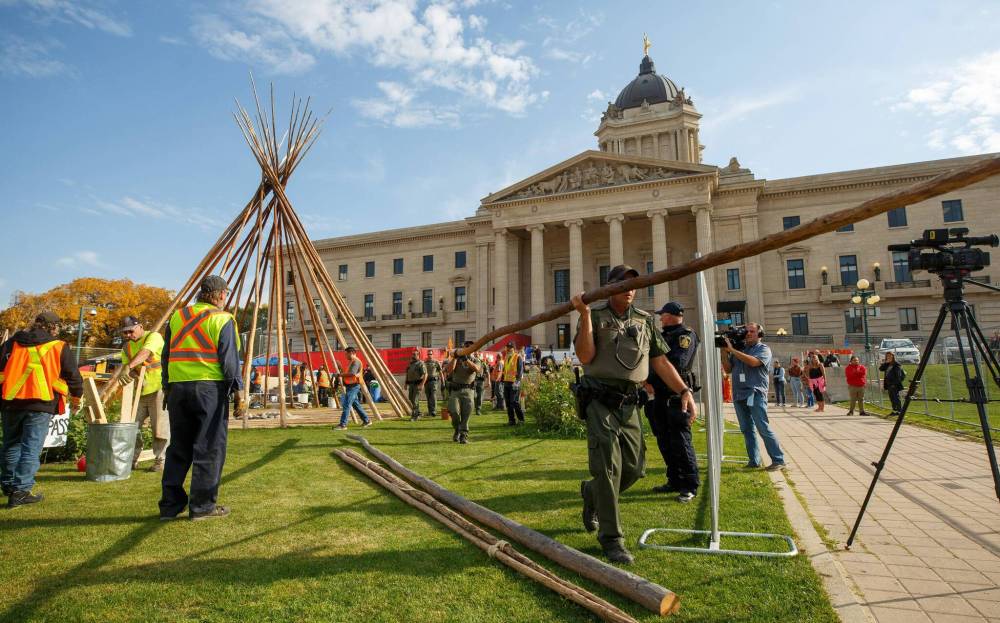Legislature camp taken down after risk escalated: police
Advertisement
Read this article for free:
or
Already have an account? Log in here »
To continue reading, please subscribe:
Monthly Digital Subscription
$0 for the first 4 weeks*
- Enjoy unlimited reading on winnipegfreepress.com
- Read the E-Edition, our digital replica newspaper
- Access News Break, our award-winning app
- Play interactive puzzles
*No charge for 4 weeks then price increases to the regular rate of $19.00 plus GST every four weeks. Offer available to new and qualified returning subscribers only. Cancel any time.
Monthly Digital Subscription
$4.75/week*
- Enjoy unlimited reading on winnipegfreepress.com
- Read the E-Edition, our digital replica newspaper
- Access News Break, our award-winning app
- Play interactive puzzles
*Billed as $19 plus GST every four weeks. Cancel any time.
To continue reading, please subscribe:
Add Free Press access to your Brandon Sun subscription for only an additional
$1 for the first 4 weeks*
*Your next subscription payment will increase by $1.00 and you will be charged $16.99 plus GST for four weeks. After four weeks, your payment will increase to $23.99 plus GST every four weeks.
Read unlimited articles for free today:
or
Already have an account? Log in here »
Hey there, time traveller!
This article was published 05/10/2022 (1159 days ago), so information in it may no longer be current.
Winnipeg police say they had no choice but to take apart a months-long encampment on the north side of the Manitoba legislature because the potential for violence had ratcheted up in recent weeks.
As evidence of the dangerous conditions at the so-called law lodge, they say officers found a number of weapons when they removed two teepees and equipment from the site, including three axes, a hammer, hatchet, body armour, a three-foot club, a spear and a machete.
“When safety becomes a factor, we are obligated and must respond, and we did respond (Tuesday),” said Supt. Bonnie Emerson at a news conference Wednesday to announce five additional people from the camp had been charged with obstructing a peace officer.

MIKE DEAL / WINNIPEG FREE PRESS FILES
Winnipeg police said they found a number of weapons, including three axes, a hammer, hatchet, body armour, a three-foot club, a spear and a machete.
The five accused had failed to vacate the illegal camp, police said, and were also charged with occupying a structure in the legislature precinct.
They include Trina Maggie Francois, a 45-year-old activist who sang a protest version of O Canada for the Pope during his visit to Alberta last summer to apologize for harms done to residential school survivors. She was a ringleader of the camp, which was the reprised version of the “freedom convoy” that opposed vaccine and mask mandates.
On Monday, seven others faced similar charges after police stopped protesters from erecting a third teepee at the site, which was adorned with signs and flags related to a variety of issues, from the discovery of potential unmarked graves at residential schools to COVID-19 restrictions to conflict in the Middle East.
Emerson and Dave Dalal, a fellow police superintendent, said police took action on the National Day of Action for MMIWG2S+ because they had no other option.
“If the choice would have been ours, it certainly would not have been our first choice,” Emerson said.
Members of both camps were handed eviction notices on Aug. 17 and told to vacate within a week, but the north camp continued to increase in size.
Dalal also said the north camp members had stopped co-operating with police liaison efforts and their “rhetoric and aggression” had escalated.
“The actions over the last two days… is a specific result of escalating safety concerns from the site that we’ve received from multiple sources. These include the public, these include government sources, and these include our members’ own interactions,” Dalal said.
The camp on the north lawn was separate from an Indigenous-led camp on the east lawn, which was not the subject of police action.
Emerson said although there had been some crossover and communication between the two camps, “the leadership is vastly different.”
“They had specifically different ideologies of why they’re down there,” Dalal said.
Dalal said there is no imminent enforcement action planned against the eastern camp, which was set up in 2021 to maintain a sacred fire until all potential unmarked graves are identified at former residential schools across Canada.
“It’s up to us to continue to assess the risks every single day, continue to gather information, determine whether the situation has changed to a point where we do have to take a different approach. At this point, we are still on the path of trying to resolve that camp peacefully,” Dalal said.
Both police executives said the service supports Canadians’ charter right to protest safely.
“There’s no problem protesting down at the legislature… however, there is now a law in place in this land that prohibits new structures from being built, and that will be enforced,” Dalal said.
He said most of the 12 accused were released by the courts on undertakings with conditions.
No one was charged with weapons offences because they were not carrying the items at the time.
erik.pindera@freepress.mb.ca
Twitter: @erik_pindera

Erik Pindera reports for the city desk, with a particular focus on crime and justice.
Our newsroom depends on a growing audience of readers to power our journalism. If you are not a paid reader, please consider becoming a subscriber.
Our newsroom depends on its audience of readers to power our journalism. Thank you for your support.






